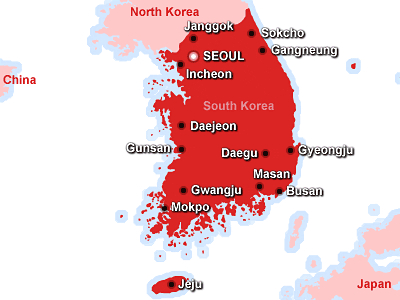By Bae Ji-sook
Staff Reporter,"The Korean Times", Mon April 19, 2010
Ash from the volcanic eruption in Iceland is forecast to reach the Korean Peninsula's atmosphere Tuesday, the weather agency said Monday. However, its impact on respiratory diseases or other health conditions is expected to be minimal.

According to the Korea Meteorological Administration, the volcanic ash from Eyjafjoll will enter the atmosphere 6,000 to 8,000 meters above the ground on Tuesday and 3,000 to 5,000 meters above it on Thursday.
"The heavier ashes have already been scattered in the European atmosphere and people will not be affected by the micro-scale dusts," it said in a press release. "Some people might be able to detect the dust."
The clouds of ash, on the other hand, have halted flights around the world as most airports in Europe have temporarily shut down. The dust is said to interfere with the jet engines and other critical parts of the airplane.
The eruption caused virtually all airports in England, Scotland, the Netherlands, Belgium, northern France, Poland, the Czech Republic, Sweden, Denmark, Finland and much of Norway, Italy, Bosnia, Croatia and Slovenia to close. More than 50,000 flights have been canceled in Europe so far and the International Civil Aviation Organization assumes the damage will surpass that following 9/11 in 2001, when all flights to the U.S. were canceled. International media said the airlines are collectively losing more than $200 million a day.
Here, a total of 33 flights from Incheon International Airport were grounded Monday, for four consecutive days, as more airports in southern European states closed due to the movement of the ash plume.
Foreign passengers have been put up at nearby inns and hotels till relevant flights are available. Those who insisted on waiting inside the airport were provided with blankets, shower facilities, beverages and vouchers for canteens.
``It seems that the suspension of flights will last for longer than we expected,'' Kim Ki-min, spokesman for the airport, said.
Kim did not give details on the damage the cancelations have caused, but it was evident on Monday as 70 employees from 38 domestic companies couldn't fly over to Germany for Hanover Messe, an international trade show, held Monday through Friday. The Korean booth is practically empty, they said. Some other passengers have complained about business emergencies, too.
However, it seems that carriers may face another bump as Icelandic geologists warned about the possible eruption of the Katla volcano in the near future, according to Xinhua News.
``Flights to Europe are unlikely until the end of the month,'' an Asiana Airlines official said. ``We won't resume flights until everything is proved to be safe."
|
No comments:
Post a Comment